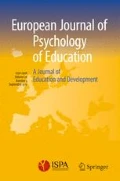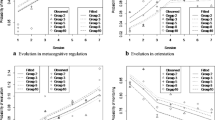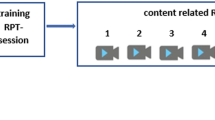Abstract
This study investigates (1) the impact of structuring versus reflection-provoking support on university students’ adoption of socially shared metacognitive regulation (SSMR) during face-to-face peer tutoring (PT) and (2) the relation between SSMR and group performance. A quasi-experimental design was adopted, involving 72 educational sciences students who were randomly assigned to PT-groups of six. Each group was provided with either structuring (SS) or reflection-provoking (RS) support. The training and closing PT-session of six groups in each support condition were videotaped (48 h). SSMR was studied by means of systematic observation of video-recorded PT sessions, whereas PT groups’ score on the assignment during the last PT session served as performance measure. The results revealed only significant differences in SSMR between both support conditions, when the proportion of students actively involved in SSMR, was taken into consideration. More specifically, PT groups in the RS condition revealed significantly more SSMR in which (nearly) all students are engaged, as compared with PT groups in the SS condition. The correlational analyses further indicated that only SSMR representing a high participation degree of (nearly) all students is significantly positively related to PT groups’ performance.

Similar content being viewed by others
Notes
Given that the empirical research on both shared regulation (social dimension of regulation of cognition, motivation, and behavior during learning) and SSMR (social dimension of regulation of cognition), is only currently unfolding, the available literature on the effectiveness or support mechanisms is not always exclusively focused on SSMR. We aimed at explicating differences in research foci as much as possible and therefore adopt the terms “shared (metacognitive) regulation” or “shared regulation” when previous findings are not exclusively applicable to SSMR
In total, twelve groups of six students and two groups of five students were involved in the RPT intervention. Given that the video equipment was limited, we opted for recording the RPT sessions of the groups consisting of six students, in order to maximize the comparability among the groups included in the present study.
Although the relation between the dependent variable and the covariate was linear for all three models tested, it should be noted that some correlations were low (i.e., R2 ranging from .201 to .534).
References
Azevedo, R., & Hadwin, A. F. (2005). Scaffolding self-regulated learning and metacognition: Implications for the design of computer-based scaffolds. Instructional Science, 33(5-6), 367–379.
Berthold, K., Nückles, M., & Renkl, A. (2007). Do learning protocols support learning strategies and outcomes? The role of cognitive and metacognitive prompts. Learning and Instruction, 17(5), 564–577.
De Backer, L., Van Keer, H., & Valcke, M. (2015a). Exploring evolutions in reciprocal peer tutoring groups’ socially shared metacognitive regulation and identifying its metacognitive correlates. Learning and Instruction, 38, 63–78. https://doi.org/10.1016/j.learninstruc.2015.04.001.
De Backer, L., Van Keer, H., & Valcke, M. (2015b). Socially shared metacognitive regulation during reciprocal peer tutoring: identifying its relationship with students’ content processing and transactive discussions. Instructional Science, 43, 323–344. https://doi.org/10.1007/s11251-014-9335-4.
De Backer, L., Van Keer, H., Moerkerke, B., & Valcke, M. (2016). Examining evolutions in the adoption of metacognitive regulation in reciprocal peer tutoring groups. Metacognition and Learning, 11, 187–193. https://doi.org/10.1007/s11409-015-9141-7.
De Backer, L., Van Keer, H., & Valcke, M. (2020). Variations in socially shared metacognitive regulation and their relation with university students' performance. Metacognition and Learning, 15, 233–259. https://doi.org/10.1007/s11409-020-09229-5.
Dillenbourg, P. (2002). Over-scripting CSCL: The risks of blending collaborative learning with instructional design. In P. A. Kirschner (Ed.), Three worlds of CSCL: Can we support CSCL (pp. 61–91). Heerlen: Open Universiteit Nederland.
Hadwin, A. F., Järvelä, S., & Miller, M. (2017). Self-regulation, co-regulation, and shared regulation in collaborative learning environments. In D. H. Schunk & J. Greene (Eds.), Handbook of self-regulation of learning and performance (2nd ed., pp. 83–106). New York: Routledge.
Iiskala, T., Vauras, M., Lehtinen, E., & Salonen, P. K. (2011). Socially shared metacognition in dyads of pupils in collaborative mathematical problem-solving processes. Learning and Instruction, 21(3), 379–393.
Iiskala, T., Volet, S., Lehtinen, E., & Vauras, M. (2015). Socially shared metacognitive regulation in asynchronous CSCL in science: Functions, evolution, and participation. Frontline Learning Research, 3, 78–111.
Isohätälä, J., Järvenoja, H., & Järvelä, S. (2017). Socially shared regulation of learning and participation in social interaction in collaborative learning. International Journal of Educational Research, 81, 11–24.
Järvelä, S., & Hadwin, A. (2013). New frontiers: Regulating learning in CSCL. Educational Psychologist, 48(1), 25–39.
Järvelä, S., Kirschner, P. A., Panadero, E., Malmberg, J., Phielix, C., Jaspers, J., Koivuniemi, M., & Järvenoja, H. (2015). Enhancing socially shared regulation in collaborative learning groups: Designing for CSCL regulation tools. Educational Technology Research and Development, 63(1), 125–142.
Järvelä, S., Kirschner, P. A., Hadwin, A., Järvenoja, H., Malmberg, J., Miller, M., & Laru, J. (2016a). Socially shared regulation of learning in CSCL: Understanding and prompting individual- and group-level shared regulatory activities. International Journal of Computer-Supported Collaborative Learning, 11(3), 263–280.
Järvelä, S., Malmberg, J., & Koivuniemi, M. (2016b). Recognizing socially shared regulation by using the temporal sequences of online chat and logs in CSCL. Learning and Instruction, 42, 1–11.
Khosa, D. K., & Volet, S. E. (2014). Productive group engagement in cognitive activity and metacognitive regulation during collaborative learning: Can it explain differences in students’ conceptual understanding? Metacognition and Learning, 9(3), 287–307.
Kirschner, F., Paas, F., & Kirschner, P. A. (2009). A cognitive load approach to collaborative learning: United brains for complex tasks. Educational Psychology Review, 21(1), 31–42.
Kistner, S., Rakoczy, K., Otto, B., Dignath-van Ewijk, C., Büttner, G., & Klieme, E. (2010). Promotion of self-regulated learning in classrooms: Investigating frequency, quality, and consequences for student performance. Metacognition and Learning, 5(2), 157–171.
Malmberg, J., Järvelä, S., Järvenoja, H., & Panadero, E. (2015). Promoting socially shared regulation of learning in CSCL: Progress of socially shared regulation among low- and high-performing groups. Computers in Human Behavior, 52, 562–572.
Miller, M., & Hadwin, A. (2015). Scripting and awareness tools for regulating collaborative learning: Changing the landscape of support in CSCL. Computers in Human Behavior, 52, 573–588.
Molenaar, I., van Boxtel, C., & Sleegers, P. (2010). The effects of scaffolding metacognitive activities in small groups. Computers in Human Behavior, 26(6), 1727–1738.
Näykki, P., Järvenoja, H., Järvelä, S., & Kirschner, P. (2017). Monitoring makes a difference: Quality and temporal variation in teacher education students’ collaborative learning. Scandinavian Journal of Educational Research, 61(1), 31–46.
Panadero, E., & Järvelä, S. (2015). Socially shared regulation of learning: A review. European Psychologist, 20(3), 190–203.
Raes, A., Schellens, T., De Wever, B., & Benoit, D. (2016). Promoting metacognitive regulation through collaborative problem solving on the web: When scripting does not work. Computers in Human Behavior, 58, 325–342.
Reiser, B. J. (2004). Scaffolding complex learning: The mechanisms of structuring and problematizing student work. The Journal of the Learning Sciences, 13, 273–304.
Rogat, T. K., & Adam-Wiggins, K. R. (2015). Interrelation between regulatory and socioemotional processes within collaborative groups characterized by facilitative and directed other-regulation. Computers in Human Behavior, 52, 589–600.
Schoor, C., & Bannert, M. (2012). Exploring regulatory processes during a computer-supported collaborative learning task using process mining. Computers in Human Behavior, 28(4), 1321–1331.
Schoor, C., Narciss, S., & Körndle, H. (2015). Regulation during cooperative and collaborative learning: A theory-based review of terms and concepts. Educational Psychologist, 50(2), 97–119.
Sitzmann, T., & Ely, K. (2010). Sometimes you need a reminder: The effects of prompting self-regulation on regulatory processes, learning, and attrition. Journal of Applied Psychology, 95(1), 132–144.
Topping, K. J. (2005). Trends in peer learning. Educational Psychology, 25(6), 631–645.
Van den Bossche, P., Gijselaers, W., Segers, M., & Kirschner, P. A. (2006). Social and cognitive factors driving teamwork in collaborative learning environments: Team learning beliefs and behaviors. Small Group Research, 37(5), 490–521.
Winne, P. (2015). What is the state of the art in self-, co-, and shared regulation in CSCL? Computers in Human Behavior, 52, 628–631.
Zimmerman, B. J. (2002). Becoming a self-regulated learner: An overview. Theory Into Practice, 41(2), 64–70
Zimmerman, B. J. (2011). Motivational sources and outcomes of self-regulated learning and performance. In D. H. Schunk & B. J. Zimmerman (Eds.), Handbook of self-regulation of learning and performance (pp. 49–64). New York: Routledge.
Funding
This study was supported by the Special Research Fund (BOF) Ghent University under grant BOF17/PDO/025.
Author information
Authors and Affiliations
Corresponding author
Additional information
Liesje De Backer. Department of Educational Studies, Ghent University, H. Dunantlaan 2, Ghent 9000, Belgium. E-mail: Liesje.DeBacker@UGent.be
Current themes of research:
Self-regulated learning and shared metacognitive regulation. Collaborative learning in higher education. Process-oriented analysis. Intervention studies.
Most relevant publications in the field of Psychology Education:
De Backer, L., Van Keer, H., Moerkerke, B., & Valcke, M. (2016). Examining evolutions in the adoption of metacognitive regulation in reciprocal peer tutoring groups. Metacognition and Learning, 11, 187-213.
De Backer, L., Van Keer, H., & Valcke, M. (2012). Exploring the potential impact of reciprocal peer tutoring on higher education students’ metacognitive knowledge and metacognitive regulation. Instructional Science, 40, 559-588.
De Backer, L., Van Keer, H., & Valcke, M. (2016). Eliciting reciprocal peer tutoring groups’ metacognitive regulation through structuring and problematizing scaffolds. The Journal of Experimental Education, 84, 804-828.
Hilde Van Keer. Department of Educational Studies, Ghent University, H. Dunantlaan 2, Ghent 9000, Belgium. E-mail: Hilde.VanKeer@UGent.be
Current themes of research:
Learning and instruction of reading and writing. Self-regulated learning. Peer learning. Intervention research.
Most relevant publications in the field of Psychology Education:
De Smedt, F., Merchie, E., Barendse, M., Rosseel, Y., De Naeghel, J., & Van Keer, H. (2018). Cognitive and motivational challenges in writing: studying the relation with writing performance across students’ gender and achievement level. Reading Research Quarterly, 53, 249–272.
De Backer, L., Van Keer, H., & Valcke, M. (2015). Exploring evolutions in reciprocal peer tutoring groups’ socially shared metacognitive regulation and identifying its metacognitive correlates. Learning and Instruction, 38, 63–78.
Vandevelde, S., Van Keer, H., Schellings, G., & Van Hout-Wolters, B.. (2015). Using think-aloud protocol analysis to gain in-depth insights into upper primary school children’s self-regulated learning. Learning and Individual Differences, 43, 11–30.
Martin Valcke. Department of Educational Studies, Ghent University, H. Dunantlaan 2, Ghent 9000, Belgium. E-mail: Martin.Valcke@UGent.be
Current themes of research:
Innovation in higher education. Integrated use of Information and Communication Technologies. Teacher education. Learning approaches.
Most relevant publications in the field of Psychology Education:
Castillo, J.N., Derluyn, I., & Valcke, M. (2019). Student teachers’ cognitions to integrate comprehensive sexual education into their future teaching practices in Ecuador. Teaching and Teacher Education, 79, 38-47.
De Coninck, K., Valcke, M., & Vanderlinde, R. (2018). A measurement of student teachers’ parent-teacher communication competences: The design of a video-based instrument. Journal of Education for Teaching, 44, 333-352.
Thuy, N., De Wever, B., & Valcke, M. (2017). The impact of a flipped classroom design on learning performance in higher education: Looking for the best ‘blend’ of lectures and guiding questions with feedback. Computers & Education, 107, 113-126.
Publisher’s note
Springer Nature remains neutral with regard to jurisdictional claims in published maps and institutional affiliations.
Appendix 1
Appendix 1
Rights and permissions
About this article
Cite this article
De Backer, L., Van Keer, H. & Valcke, M. Collaborative learning groups’ adoption of shared metacognitive regulation: examining the impact of structuring versus reflection-provoking support and its relation with group performance. Eur J Psychol Educ 36, 1075–1094 (2021). https://doi.org/10.1007/s10212-020-00511-3
Received:
Revised:
Accepted:
Published:
Issue Date:
DOI: https://doi.org/10.1007/s10212-020-00511-3




